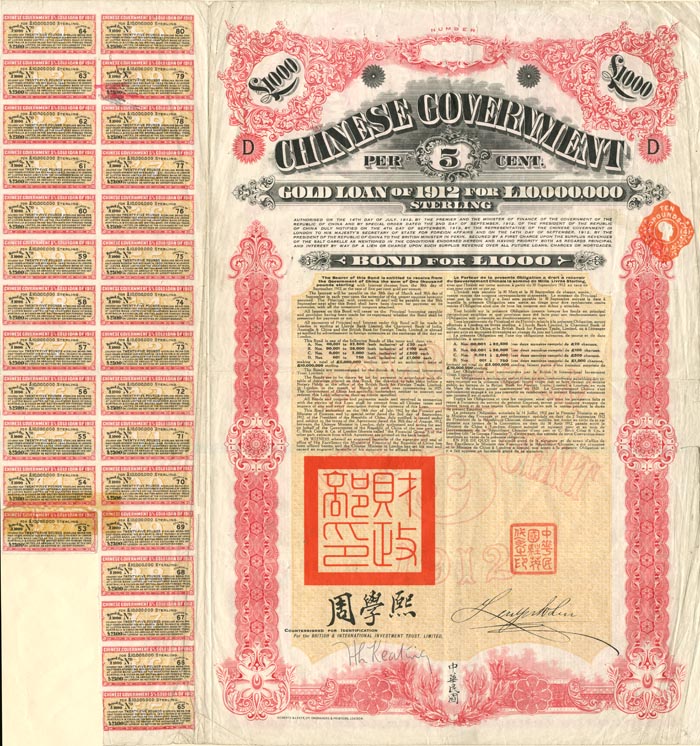£1,000 Crisp Gold Loan Chinese Government 5% 1912 Bond - China
Inv# FB6082 Bond
Republic of China, £1,000 Sterling, Chinese Government 5% Gold Loan of 1912 Bond. Known as "Crisp Loan".
The Crisp Gold Loan of 1912 was originally for the sum of £10,000,000, but only £5,000,000. was issued. The loan was: " authorized on the 14th day of July, 1912, by the Premier and the Minister of Finance of the Government of the Republic of China and by special order dated 2nd day of September, 1912 of the President of the Republic of China duly notified on the 4th day of September, 1912, by the representative of the Chinese Government in London to His Majesty's Secretary of State for Foreign Affairs and on the 4th day of September, 1912, by the President of the Republic of China to the British Minister in Pekin."
The loan was floated by C. Birch, Crisp & Co. in London at 95% on behalf of the British & International Investment Trust, Ltd. Other financial institutions acting as agents for the loan were the British Bank of Foreign Trade, Lloyds Bank and the Chartered Bank of India, Australia and China. Bearer bonds were issued in the following denominations: £20, £100, £500, and £1,000.
Article relating to this Chinese item: https://www.bloomberg.com/news/articles/2019-08-29/trump-s-new-trade-war-weapon-might-just-be-antique-china-debt
James Aratoon Malcolm, born 1868, was a British-Iranian Armenian financier, arms dealer and journalist.
In early 1916, he was appointed by George V of Armenia as one of the five members of the Armenian National Delegation to lead negotiations during and after the war, and the effective representative in London (the other four members were all based in Paris).
He was Chairman of the Royal Thames Yacht Club, and a founder in 1894 of the British Empire League. He was awarded an OBE in 1948.
He was the son of Aratoon Malcolm, of Bushehr in Qajar Persia, whose family had lived in Persia "since before Elizabethan days", in shipping and commerce, having acted as treasurers to British Missions to the Shah of Persia. They had numerous contacts with significant financial families in the region such as that of David Sassoon.
He came to England at the age of 13 years old in 1881, for his education, under the guardianship of Albert Sassoon. As a boy he was friends with Albert Goldsmid. He was educated at the private Herne House School in Margate, Kent, before attending Balliol College, Oxford between 1886-9.
After leaving university, he published a political-financial newspaper in London. He later became one of the founders and editors of the Hayastan Daily during the Armenian resistance during the Armenian Genocide.
His arms dealing career began with making the first offer to provide 1,000 sharpshooters for service in Southern Africa, and he fitted out Major Albert Gybbon Spilsbury's Tourmaline yacht for its controversial 1897 expedition to Mogador, Morocco.
As a contractor for public works he proposed to finance the Baku aqueduct, the longest water conduit in Europe which was ultimately financed by Zeynalabdin Taghiyev, the extensions to the London Docks, and the Canadian Trent–Severn Waterway.
In 1912 he negotiated on behalf of the Chinese government the £5 million Crisp loan led by Charles Birch Crisp to the new Republic of China.
A bond is a document of title for a loan. Bonds are issued, not only by businesses, but also by national, state or city governments, or other public bodies, or sometimes by individuals. Bonds are a loan to the company or other body. They are normally repayable within a stated period of time. Bonds earn interest at a fixed rate, which must usually be paid by the undertaking regardless of its financial results. A bondholder is a creditor of the undertaking.










Ebay ID: labarre_galleries